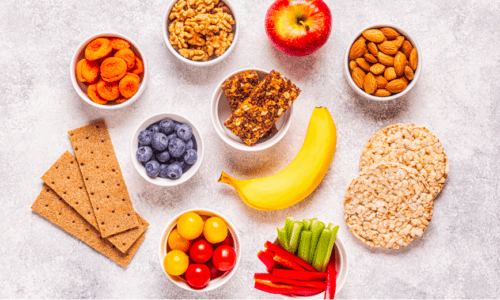Mindful Eating and How to Improve Our Relationship With Food |
Join our host Olga Villaverde and registered dietitian Lucette Talamas and psychotherapist Nicole Rodriguez as they have a conversation about how to be mindful when eating and how to keep a good relationship with food and eating.
Transcript
Many of us are aware of what we eat but a lot of us really don’t think about how we eat so we invited two insiders to share ways to improve our relationship with food take a look mindfulness is focusing on the here and now you know so often we’re worrying about the future you know what if I always tell I tell my you’re not allowed to say what if in this office because that can take you down so many different paths it leads to depression and anxiety so it’s really focusing on you know what’s going on at the moment and sometimes even if right now we’re going through a situation that’s difficult and okay I bring it even down to what’s going on right now and it’s focusing on that it’s focusing focusing on where you’re at what you’re doing to kind of help calm some of that anxiety all right now let’s take that word and include mindful eating we have a graphic and I’m gonna have lucet tackle this one and this is mindful eating go ahead yes so part of my being mindful like nicole just explained is being mindful when you’re eating so this is using the graphic what mindful eating is about we see the first at the top why do we eat so before you eat you know asking yourself why am I eating right now am I truly hungry then we see when do you eat so when are typical times that you eat then we see what do I eat are you choosing healthy foods are you choosing maybe high calorie foods so what are you eating then we also see how do I eat so that goes with the context of are you distracted are you on your phone as you’re eating how are you eating and then how much food do I eat and then lastly where do I eat so what are your environments and also where how am I investing my energy so am I feeling guilty we talked about that so part of the mindfulness eating cycle includes asking yourself all those questions so sometimes we just think of one question of what am I going to eat but it involves a lot more questions than that and when you do all those questions the why when what how how much where what is the purpose of doing something like that it’s to bring you back to the moment of why are we eating basically it’s the first question so many times we’re putting food and calories into our mouth through beverages or foods or snacks without realizing it so mindfulness in the present moment helps you truly enjoy your food and control portion sizes and then in the long term mindfulness has been shown to help with managing your weight because if we’re present like nicole just explains during the eating moments you are truly thinking and savoring your food you can help control your portions and you can also think of foods in a non-guilty way if you also learn how to enjoy those portions great stuff all right so part of mindfulness is bridging a mind and body connection that can help you focus on the here and then now here’s an explanation from a doctor take a look mindfulness is a buzzword these days but what does it really mean at its core there are two big components the first one is putting our attention in the moment where we want it to be dr richa sood says to pay attention to the here and now that way your mind won’t wander or focus on the negative but sometimes the present moment may be dull it may be painful so attention alone doesn’t cut it we also need to be looking at the moment in a non-judgmental fashion what does that mean when we get a thought or an experience we immediately have a response to it good bad not so good I don’t care I’m scared we just want to be safe dr sood says before you respond pause mindfulness is attention focus and delayed judgment which decreases emotional reactivity mindfulness may reduce stress and improve quality of life I think one important aspect is being mindful of when we are full and a lot of people lose sight of that we have a great it’s called the hunger fullness scale I think this really helps explain to our viewers lucette 1 through 10 what this means sure so part of being mindful is being aware of your hunger and your fullness so the only true reason we should be sitting to eat a meal or snack is depending on our hunger so how can you assess your hunger we notice that adults have almost desensitized themselves to their hunger cues so the hunger scale starting at a 1 we see the starving feeling faint feelings and then at a 10 we see bursting painfully full I like to say maybe thanksgiving day feeling so there’s these numbers in between so as you go through the scale you can assess what your hunger truly is and also assess when you should start to feel satisfied to stop eating so if you look at number three that’s usually the number we want to start eating okay so believe it or not a little growl doesn’t mean we’re starving now the issue I see is that when people feel the growl that’s when they start to think what should I go eat and by the time you actually eat you’re at a one or a two so it’s being ready to eat when you’re at a three and then stopping when you’re actually at a six which is the word satisfied not necessarily a seven which is full okay so six is our number yes okay and I’ve heard that it takes about 20 minutes for your brain to tell your stomach that you’re full so if you eat slower it’s actually better right right that kind of helps a little bit all right just want to show our viewers real quick our phone number again just like james did if you’d like to give us a phone call here at the health channel it’s eight five five seven nine six four four seven five now where does hangry fit into this hunger fullness scale we’re starting to hear that hangry I’m hangry have you heard this before have you yeah yeah why did you tell our viewers what it is it’s when you’re so hungry that you’re angry I know some people like that oh I get like that I cannot skip a meal I mean I eat like seven times a day because I eat little bits all three days if I do not eat I get I get angry okay how does that fit in you shouldn’t get there right I think you should definitely not get there like luce was saying you know if you’re getting if you’re eating at the which one is it the number three then yeah you’re not hangry or not because like she said at that point now you’re gonna eat whatever you know I know for me personally when I’m sitting and I if I meal plan if because I don’t always do it um I plan on my meals I know it’s easier to eat healthy because I have this planned out beforehand but when I’m at work and I’m uber eating and I only have an hour to eat and I’m hurrying up scrolling through the choices I’m just gonna quick okay what’s the fastest thing that can get here and then that tends not to be the healthiest of choice so it’s you know trying not to get to those points especially not hangry because then you’re just gonna eat anything oh I know yeah it’s horrible so I also know there are comfort foods for some people when they’re anxious or stressed out and it seems that people also when they’re depressed they seem to go to those comfort foods right right so a comfort food is generally a food that brings you back to we talked about like that relation with like family or a certain memory but the actual food itself usually is a high calorie food so it’s something that is high in fat high in sugar or carbs I’ve noticed it’s usually the chocolate cake a bag of gummy bears why is it always why can it be 10 apples or a bag of grapes why is it always like the sweets well I think sweets does activate the reward system in your brain so you are for that you know for those that momentary time you are getting a reward and like you said said a lot of this is also tied to memory you know those thanksgiving meals with family that you know you’re having the pie you’re having the rice and beans you’re having the pork if you’re a cuban family it’s not cookies still pork you know that’s thai if it’s a good memory then those foods now are tied to that so when we’re feeling sad when we’re feeling lonely we want those foods because it reminds us of our family and that you know that better time that we had so it’s a mix between that yes it does give you momentary pleasure but then it also ties to the memory aspect of it but once in a while it’s good to have like you know one of those memories that I’ll say oh my abuela used to do this for me and then it brings back a memory those are okay moments right right so when it comes to mind to comfort foods you can either learn to be mindful during that moment if it is something that’s high in fat carbs and sugar because it could be like we just talked it could be something salty it could be something sweet or if it’s a food you definitely want to enjoy more often because it reminds you of your abuela or your family I’d suggest to find some healthier recipes you know some light versions and yeah modify your traditional home your traditional comfort food for a lighter version that you can maybe enjoy more often by the way if you’re like me and you want to remember your abuela and her compo but you know the recipe is a little bit too fattening lucette suggests just looking for a healthier recipe modify it and remember the good times by the way just to give you a head start on something really healthy here’s a recipe for three bean chili you








